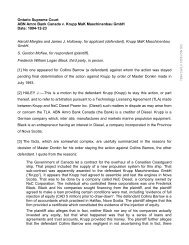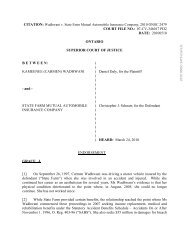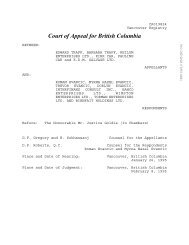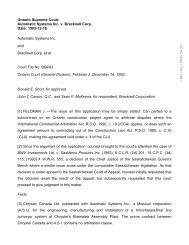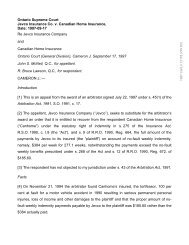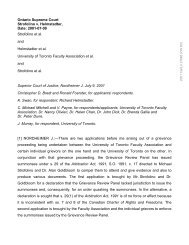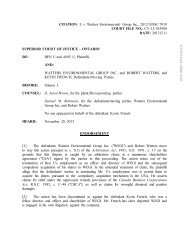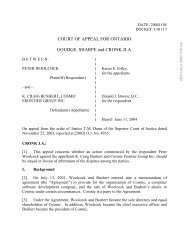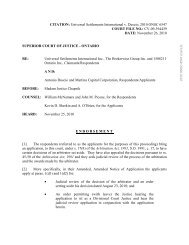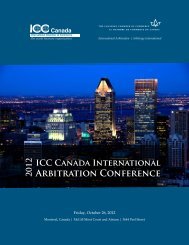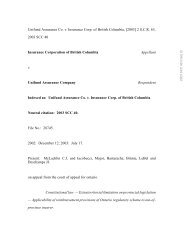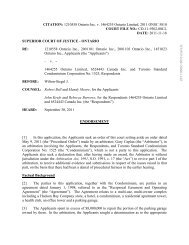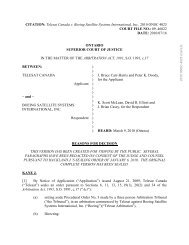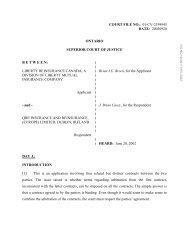United Mexican States v Karpa 2003 CanLII 34011 - Arbitration Place
United Mexican States v Karpa 2003 CanLII 34011 - Arbitration Place
United Mexican States v Karpa 2003 CanLII 34011 - Arbitration Place
- No tags were found...
Create successful ePaper yourself
Turn your PDF publications into a flip-book with our unique Google optimized e-Paper software.
- 2 -1. An order setting aside, in part, the award made by the <strong>Arbitration</strong> Tribunal (“the Tribunal”)on December 16, 2002, in Ottawa, Ontario at the International Centre for Settlement ofInvestment Disputes (Additional Facilities). This was case No. ARB (AF)/99/1 betweenMarvin Roy Feldman <strong>Karpa</strong> (“Feldman” or “the Claimant”) and the <strong>United</strong> <strong>Mexican</strong> <strong>States</strong>(“Mexico” or “the Applicant”). The arbitration arose under Chapter Eleven of the NorthAmerican Free Trade Agreement (“NAFTA”) pursuant to s. 34 of the InternationalCommercial <strong>Arbitration</strong> Act R.S.O., 1990, c. I-9 (“ICAA”).[2] The Tribunal found that Mexico discriminated against Feldman contrary to Article 1102of the NAFTA. The Tribunal ordered Mexico to pay to Feldman, as damages, tax rebates thathad been withheld from Mexico because of discrimination.[3] The grounds for the application are:<strong>2003</strong> <strong>CanLII</strong> <strong>34011</strong> (ON SC)(a)(b)(c)Mexico was unable to present its case, contrary to Article 34(2)(a)(ii) of theModel Law, because – having informed the parties that it would only drawadverse inferences in the event of a party’s failure to comply with its orders – themajority of the Tribunal drew impermissible inferences (in the absence of anorder) from Mexico’s compliance with its own domestic law governing taxationlaw enforcement and taxpayer personal privacy protection;the arbitral procedure adopted by the majority of the Tribunal was not inaccordance with the agreement of the parties, contrary to Article 34(2)(a)(iv) ofthe Model Law, because it conflicted with the mandatory rules for the conduct ofinvestor-State arbitrartions under the NAFTA, in particular Article 2105 whichprohibited the Tribunal from requiring Mexico “to furnish or allow access toinformation the disclosure of which would impede law enforcement or would becontrary to the Party’s law protecting personal privacy”;by requiring Mexico to pay to the Claimant, as damages, tax rebates to which theTribunal previously held the Claimant had no legal right, the Award is, as thedissenting Arbitrator found, “repugnant”, and is in conflict with public policy,contrary to Article 34(2)(b) of the Model Law.FACTS FROM THE AWARD[4] This case concerns a dispute regarding the application of certain tax laws by Mexico tothe export of tobacco products by Corporación de Exportaciones <strong>Mexican</strong>as S.A. de C.V.(“CEMSA”), a company organized under the laws of Mexico and owned and controlled byFeldman, a citizen of the <strong>United</strong> <strong>States</strong> of America (“<strong>United</strong> <strong>States</strong>”). The Claimant, who issuing as the sole investor on behalf of CEMSA, alleges that Mexico’s refusal to rebate excisetaxes applied to cigarettes exported by CEMSA and Mexico’s continuing refusal to recognizeCEMSA’s right to a rebate of such taxes regarding prospective cigarette exports constitutes abreach of Mexico’s obligations under Chapter Eleven, Section A of the NAFTA. In particular,



